
Tuition increase to hurt not stop students, says poll
By NANCY WHITE
and BRIAN FINK
A tuition increase at
Peninsula College would hurt
but not stop the majority of
students from attending school
next year, according to a recent
poll conducted by the
Buccaneer staff.
Jeff Pope said: “I’ll be
scraping but I will still be able
to go.”
Of the 35 students polled,
seven said a tuition increase
would stop them from going
next year, but 28 said it
wouldn’t.
Non-resident community
college tuition will go from $681
to $1,200 per year, a 76 per cent
increase. As of now students are
only paying about 60 per cent of
the total cost of their education.
The rest comes from state
taxes. Most of the students
polled said out-of-state
residents should pay the full
cost of their education.
Of the 35 polled, 33 were
residents and two were nonresidents. Seven said they
should not have to pay, 26 said
they should, and one was
undecided Bonita Sanwald, a state
resident, said: “It would be
more likely to exclude them for
attending here. We would have
less variety of students.”
SaBonne Hartman, also a
resident; “No, because it would
be too much money for this
institution, and it might
possibly affect enrollment.”
However, John Bridge, a
resident, said: “Junior colleges
should be more of a local type of
thing. I don’t think we
particularly need out-of-state
residents.”
Sharon Boddy, a non-resident,
said: “An increase is something
everybody is faced with. I don’t
see why out of state students
should be exempt.
It’s your option; you don’t
have to pay. Wherever you go
you are going to have to meet
the demands. I think that
whatever the price, if I’m that
eager to go, it is my
responsibility to foot any bill I
have to pay.”

Student majority favors Stadium Generale credits
Studium Generale students
agree with the Community
Service Committee’s
recommendation that up to and
including six Studium Generale
credits be allowed as elective
transferable credit.
According to a poll of Studium
Generale students, 140 agreed
with the recommendation, 13
disagreed and one had no
comment. Only two said no
transferable credits should be
allowed, and 13 said only three
credits be allowed. Six people
responded that more than six
transferable credits be allowed.
The recommendation by the
Community Service Committee
was passed at the Feb. 5
meeting. If the recommendation is approved
by the Instructional Council,
students attending Peninsula
College for two years may
receive Studium Generale
credit fall, winter and spring
quarters for both years. No
more than six credits would be
allowed.
Studium Generale has come
under attack recently as not
being a viable learning
experience. The Instructional
Council will be deciding
whether it is or not. A total of
120 students responding to the
questionnaire said the class is a
viable learning experience
equal to other one or two hour
credit transferable courses, 25
replied the course is better than
other one- or two – hour credit
transferable courses, and only
five said the course is inferior.
The poll showed 170 students
in favor of Studium Generale
becoming a regular course in
the daytime course offerings of
Peninsula College. Nine said it
shouldn’t, and three offered no
comment.
The opinion poll also reflected
interest in Studium Generale,
with 80 students saying they
would attend the course if
offered on an audit (non-credit)
basis only, 55 said they
wouldn’t, and three had no
comment.
Students interested in the
future of Studium Generale
may report the Instructional
Council via Mr. Floyd Young. If
the opinion poll holds true,
students are overwhelmingly in
favor of the Community Service
Committee’s recommendation.
Philosophy prof Adrian Siegler dies after fast
Adrian Siegler, professor of
philosophy at the University of
Washington, died Feb. 17 near
Homestead, Fla., after ending a
five month fast.
Prof. Siegler visited PC
during fall quarter to lecture
about East Indian philosophy.
He spoke at a Studium Generale
session, in English classes, and
in the philosophy class.
He had been on a liquid-diet
since September, but has
undertaken others in the past
few years successfully. The
fasts were used to drive poisons
from his body.
The transition from a fast to a
regular diet is the most difficult
time for the body. When Prof.
Siegler began to eat some solid
foods, his digestive system
couldn’t handle it, thus he died
just one month from his 43rd
birthday.
Aside from his academic
activities, Siegler was involved
in a coffee shop co-op food store
that was to have opened soon in
Seattle. He also was buying
some acreage for a farm in the
Sequim area.
BOC doing job, members say
General consensus of the PC
Board of Control is that the
group is doing its job, and
anyone interested in expressing
opinions or ideas to the board
should attend the meetings
every other Tuesday noon in the
boardroom.
The discussion sprang from
questions concerning recent
editorial opinions expressed in
the Buccaneer saying that the
BOC is not doing anything.
During the meeting, held Feb.
18, the BOC felt that the
comments did not deserve any
reply or special action.
The BOC agreed to purchase
10 Community Concert tickets,
and five Port Angeles
Symphony tickets for next
year’s season, to be checked out
to students during the 1975-76
school year.
According to the treasurer’s
report, Student Body
Publications, BOC printing,
special events, WAA, social
events, drama productions, and
basketball have encumbered
the most expenses. Publications
have cost $2280, social events
$2424, WAA $1298, and
basketball $5621, as of Feb. 4.
The least amount expended was
for the literary magazine. As of
Feb. 4 no money has been spent
on Tidepools.
President Tim Fryer and
Sophomore Representative
Brian Fink did not attend the
meeting.
PC students, faculty in community play
Two Peninsula students and
two faculty members are
involved in tonight’s opening
production of “One Flew Over
the Cuckoo’s Nest.”
Parker Smith, Johnna
Winters, students, and Earl
Cl^rk, journalism instructor in
the cast of this Community
Players production. Miss Helen
Farrington, nursing instructor,
is working on the lights.
Parker Smith, a forestry
student, has participated in four
Community Player productions
in the last 18 months.
“The play, ‘One Flew Over
the Cuckoo’s Nest’, is one of the
best I’ve ever been in so far,” he
said. “There is a good deal of
humor, while the play is
basically serious. I urge people
to see the play. I know they’ll
enjoy it.”
Parker also will be in the next
production, “The Good Woman
of Szechuan,” to be directed by
Miss Marjorie Avalon. “She is a
woman to be respected, and I
look forward to taking part in
her next production,” he says.
“I wish I could have had more
time to be involved with the
college’s productions.”
This is Johnna Winters’ first
play. She is a freshman nursing
student. Mr. Clark and Miss
Farrington are both veterans of
the Community Players
productions.
Performances will be held
tonight and tomorrow night,
and March 3, 7, and 8 at 8 p.m.,
and Sunday, March 9, at 2 p.m.
The cost is $1 for students and
$1.50 for adults.
Parking lot victim extends thanks
Sandra L. White suffered a
bad fall in the Peninsula College
parking lot on Feb. 5 and was
taken to Olympic Memorial
Hospital, where it was learned
that her jaw was broken in two
places.
The names of the two men
who assisted her are unknown,
so Sandra wishes to say to
them: “Thank you very much
for taking me to the hospital.”
CHE faces opposition
The tuition and fees Increase being proposed by
Washington’s Council on Higher Education has met
strong opposition from many sides.
This opposition Is being tunneled primarily through
the Community College Legislative Council, a
collective organization composed of groups at every
level of community college education. These groups
include teachers, trustees, students, and others.
The CC Legislative Council explains its position In
Its 1975 United Legislative Program. It cites four
major arguments against any tuition hike. According
to the Carnegie Commission on Higher Education,
tuition charges must be held at a minimum at community colleges In order to fulfill the absolute opendoor enrollment policy.
This view Is backed by a national commission on
college financing which estimates that for every $100
annual Increase In tuition, three per cent of the
enrollment is lost.
U.S. census data explains this drop by showing that
a larger proportion of low-income students attend
community colleges than any other part of the higher
education system. Therefore, when prices go up past a
student’s economic resources, he quickly drops out.
When Washington’s Community college system was
formed, the planners, A.D. Little Company, warned of
the dangers Involved In using tuition for operating
costs and capital expenditures. Little advised that
such a system would Increase pressures for tuition
hikes. He also viewed tuition Increases as being In
contrast with an open-door enrollment policy.
In consideration of these and other factors, the CC
Legislative Council recommends that present tuition
levels should be maintained.
John Mundt, director of the State Board for Community College Education, has submitted a tuition
statement for the CHE also opposing any increases.
He cites two additional reasons: (1) there is no state
policy regarding tuition, and (2) possible adoption of a
no tuition community college system as a long-range
goal.
Obviously, groups on both sides of the tuition Increase question have done considerable work In
preparing their statements. The CHE has demonstrated several examples showing the need for such an
Increase. The opposition groups presented Impressive
results of their Investigative efforts too.
But the main problem here Is If the hike is needed
and not approved, no one has put forth any alternate
fund-raising proposal. Therefore, until one is
presented, we are stuck with our system, like It or not.
— Ed Mund
A look at the artists
‘Young Frankenstein’ comical masterpiece
By JEFF BIALIK
It is only fitting that the
funniest comedy of the year is a
Mel Brooks film. Brooks’ latest
since “Blazing Saddles” is a
comical masterpiece that will
stand on its own for quite some
time.
The film is “Young
Frankenstein,” and stars Gene
Wilder as Frederick
Frankenstein (pronounced
frahn-ken-steen), the grandson
of Baron Von Frankenstein
(pronounced frank-en-stine) the
one who created the monster
from dead tissue and put the
lame brain in it and charged it
with electricity and all that. . .
Young Frankenstein is a
brilliant brain surgeon who
wishes not to follow in the
footsteps of his grandfather.
However on a call from the
grave of his grandfather young
Frankenstein leaves the U.S.,
and fiance Madeline — it’s
true, it’s true — Kahn, and
travels to his inherited estate in
(where else?) Transylvania. In
Transylvania Frankenstein
meets the grandson of Igor,
Marty Feldman (Unlike his
grandfather Ee-gor, the new
hunch-back prefers to be called
Eye-gor, ’tis more refined ya’
know).
Frankenstein is equipped
with an assistant, Inga, played
by gorgeous Teri — get a load of
them knockers — Garr, and a
lovelorn spinster house mother,
Cloris Leachman.
While at the mansion
Frankenstein changes his
views, the pronunciation of his
name, builds a monster, Peter
Boyle, and the rest is left to the
imagination as everything
imaginable happens.
Gene Wilder and Mel Brooks
wrote the screen play, the film
is produced by Michael
Gruskoff, and of course directed
by Mel Brooks.
The movie is more detailed
than “Blazing Saddles” and, if
you can believe it, even funnier.
For fun, entertainment, and
rolling-in-the-aisles laughter,
the film is “Young
Frankenstein,” filmed in
exciting black and white —
wow!
Scoop must take stand
Last month Washington Senator Henry M. Jackson
announced his intention to seek the Democratic
nomination for President of the United States. The
election will be In November 1976 and at the present
Jackson Is considered a top contender for the
nomination.
A few days after the official five-minute announcement, Senator Jackson appeared on NBC-TV’s
Meet the Press. On that program Jackson was queried
as to his stands on particular Issues. With the style and
form of a contending candidate, Jackson took no solid
stand, offended no one, and left the viewer frustrated
with indecision.
It is now, early In the campaign, that the American
public is going to begin to weigh everything said
against or In favor of the candidate. As part of that
American public the college student also must take his
or her stand. America made a bad mistake in 1972 and
few want that nightmare repeated.
Perhaps Jackson would make a fine President.
Perhaps Jackson’s diplomacy can bring back faith In
the U.S. No one will be able to tell, though, If the man
does not take sides, select a particular stand, and let it
all hang out.
On the same token, the future of America Iles in the
hands of the young voters. Changes for the better are
not going to come from the same old politicians,
without some new direction. In 1976 every 18-25-yearold should be registered, should vote, and with unified
action could very easily point the direction the United
States will go in the next four years.
All young adults should begin to pay attention to the
potential candidates, and should voice opinions.
Looking Intelligently toward tomorrow, the ’72
mistake will be forgotten.
At the same time, Sen. Henry M. Jackson should
best tear away from the political stereotype and
become almost human, or tomorrow will come
somewhat short of 1976 paydirt.
— Jeff Bialik
Library Corner
By THE LIBRARY STAFF
Ski Magazine’s
“Encyclopedia of Skiing,” is a
profusely illustrated, oversize
book in which you will find
everything you want to know
about skiing — its history,
equipment, various skiing
techniques, ski competition
results, where to ski, and the
meaning of ski terms.
In its fact-crammed pages,
you discover fascinating stories
about skiers and skiing
throughout the world. You find
practical information about the
evolution, selection and care of
ski equipment including
clothing and apres-ski outfits;
detailed instruction on the
various skiing techniques for
beginning, intermediate, and
advanced skiers; safety rules,
travel suggestions, and
approximate skiing costs;
descriptions of ski areas
throughout the world.
Here too are the 25 steepest
and the 18 easiest ski trails in
North America; advice on
budget trips in the United States
and Europe; the International
Skier’s Lexicon and a list of the
Ski Associations ofthe World. In
fact, this book has everything
that the skier would want to look
up — presented in an easy-touse, attractive format.
“Basic Boating,” Revised
Edition, by Howard L. Andrews
and Alexander L. Russell, is
like receiving a course in
seamanship from the experts,
covering every important
subject affecting your life on
board.
From basic instructions on
the techniques of small boat
piloting to detailed chapters on
mechanical and electronic aids
to navigation . .. from accident
prevention and first aid through
sea law applied to the small
boat owner . . . from the safety
cautions to observe while
fueling small craft to precise
explanations of charts and
projections — every
conceivable aspect of the
complexities of boats and and
skills of boatmen is presented in
lucid, well-organized, and
profusely illustrated sections of
this handsome volume.
Letters PC praised
Editor, The Buccaneer:
During these weeks many
students will contemplate their
future academic career and
make plans to apply to senior
institutions. I thought that it
would be of help to some of the
present student body to relate
some of my experiences and
impressions after having gone
on from Peninsula College to
the largest University in this
state, the University of
Washington.
Contrary to some people’s
opinion, I feel that a junior
college is the most beneficial
way to begin one’s college
education. The possible
advantages of a large
university, including a
multitude of classes and
“name” professors are far
outweighed by the reality of a
freshman lost in this
environment, beginning classes
with upwards of seven hundred
students, and teaching
assistants giving the lectures.
The small classes, extremely
competent faculty, and a good
course variety combine to make
Peninsula College an excellent
place to take fundamental
classes necessary for any
college degree.
All I can say is, if you have
put forth an average to better
effort at P.C., where some
classes are tougher than at the
four-year schools, you should
have no worries of making it
through the junior and senior
years if you can self-discipline
yourself, as no one is looking out
for you but yourself.
I wish to publicly
acknowledge the guidance and
assistance given me by its
faculty, including Professors
Churchley, Fisch, Quast, Spicer
and Spillane.
ThomasW. McLane
Long live S. Generale
Editor, The Buccaneer:
Long Live Studium Generale!
I thought Dr. Tolman, for
example, was brilliant. Some of
his ideas were new to me and all
were interesting. Perhaps if
some students couldn’t follow
him completely because of lack
of background, his talk would
send themto the library to learn
more about his subject. This
cross-fertilization is an
important part of a liberal
education.
I personally have always –
thought this series of lectures
was a good idea, valuable to
both Peninsula College students
and visitors from the
community. Therefore, I
repeat, Long live Studium
Generale!
Marjorie Millo


Intramural bowling in tourney playoff
Intramural Bowling for men
and women started with a bang
this season as 19 men and nine
women entered in the double
elimination tournament.
In the male tournament, it
looks at this point as if the
winner will be Jerry Allen or
Charlie Dewitt, while Chris
Carlson and Lindsey Schultz
lead the women. The semifinals and finals in both
tournaments are being held this
week.
If Jerry Allen should capture
the bowling title, it will be his
fourth intramural title of the
season, as he has already won in
football, basketball, basketball
free-throw and volleyball,
making him eligible for the
Intramural Player of the Year
award.
In other intramural news, the
protest filed by the Looney Bins
basketball team against the
Nummies team, after much
discussion, a vote, and a revote, was rejected, which
positively decided the Big
Thrills asintramural basketball
champions.
Following is a list of spring
quarter activities, and their
sign-up deadlines:
Badminton, April 7.
Tennis, May 2.
Horseshoes, May 6.
Softball, May 20.
Campus sports scene
Slow pitch takes field
By ED BUSH
Along with the beautitiful and sunny days of spring, comes
the annual baseball season.
Peninsula, however, will not produce a boys’ team this
year. The reasons are twofold. First, the win-loss record of
the Pirateslast yearwas a little lessthan poor. The team won
one game, and forfeited the latter part of the season due to
lack of interest by the players.
Second, after the last few games were cancelled, and the
uniforms turned in, someone stole most of the jerseys.
Although they were nothing more than burlap sacks with
holesin them, theywere all PChad. Thus, no team.
But the girls do have a slow pitch team that does have
promise. Many ofthe girlsthat led the teamto fourth place in
their league last year will be returning.
Teams competing against the girls will be locally sponsored, such as Thunderbird Tavern. Humdincer. Next Door
(which sponsors the high school team), Heidelberg, Rainier,
Eagles, Sawtooth and more.
Thunderbird Tavern came in first place last year, and is
strong contender for the title again.



Jerry Allen, upper left, and
Charley DeWitt, upper
right, were leading Peninsula College intramural
bowlers at last reports. Also
in there pitching—er,
bowling—was Harold
Walters, left, when Buccaneer photographer Jon
Hoagland made the scene.
Pirates lose game and sophomores
Peninsula College ended its
basketball season Wednesday,
Feb. 19, with a loss to Lower
Columbia at Lower Columbia,
94-83.
The loss gave the Pirates a
final league record of 5-9, and
counting the other 10 non-league
games, they ended with an 11-13
season record.
In the Lower Columbia game,
the Pirates were led in scoring
by Mark Ernesti with 22 points,
and Dave McDonald and Tim
Fryer with 21 and 16
respectively. Fryer also
contributed seven assists in
Peninsula’s losing cause.
Lower Columbia’s big front
line hurt the Pirates. They were
led by Nippett with 29 points,
followed by Lasich with 24 and
Morrow with 22. Lower
Columbia attempted 14 more
shots from the field than the
Pirates, hitting on 43 of 86
attempts, while Peninsula shot
36 of 72 attempts.
This game marked the end of
Peninsula College basketball
for sophomores Tim Fryer,
Mark Ernesti, Jeff Mills, Steve
Norris, Ed Bush, John
Woodman and Dan Hodgdon.
Returning from this year’s
team next year will be Dave
McDonald, Steve Willemsen
and Joe Coleman.
The team members are now
in the process of voting on this
season’s most valuable player,
most inspirational player, and
the honorary team captain. The
announcement of these players
will be at the annual awards
banquet; some time in the near
future.
As of press time, all the
season statistics have not been
totaled, but will be published in
a later issue of the Buccaneer.
PC programs compared
Faculty and administration
visited the career planning
class in a series of lectures to
explain Peninsula’s programs
and courses.
The lectures were designed to
compare PC programs and
courses with others in the state,
tell what the employment
opportunities are in our two and
four year programs, describe
the courses, and explain the
requirements for entry and
graduation from these
programs.
Mr. Dick Hendry, class
instructor, says he plans to
continue the visitations next
spring but on a much larger
scale. He wants to include high
school and more college
students.
Night visitations were held
Feb. 19 and 26. Day visitations
were Feb. 20, 25 and 27.
Final game is the same
Girls’ basketball continued
their losing streak, after
dropping their last game of the
season to Lower Columbia, 48-
15.
To start things off, Peninsula
took the early lead 2-0 on a 10-
foot bank shot by Cris
Anderson. After many missed
shots by both teams in the first
five minutes, Lower Columbia
began to pick off Pirate passes
and convert breakaway lay-ins
to win easily 48-15.
Peninsula did have a
highlight for the game
however, as Pirate forward
Darcie Caso drove through the
defense for lay-ins towards the
end of the contest.
Contemporary dance group hosts special S.G.
The Community Services
Committee will present a
“Tuesday Special” addition to
the Studium Generale lecture
series, with a special program
Tuesday, March 4, in the Little
Theater.
The 13-member American
Contemporary Dance Company
from the University of
Washington, directed by Joan
Skinner and Robert Davidson,
will present two performances
in theLittle Theater at noon and
again at 8 p.m.
The noontime performance,
“Dialogues in Dance,” is
described as a non-lecture
demonstration in which the
dancers speak about why they
dance, the relationship between
music-sound and dance, and
current trends in contemporary
dance.
The evening performance will
offer five contemporary works,
including “Children of Light,” a
dance based on principles of
indeterminacy with original
music by the Cybernetic
Renaissance Band.
The noon performance is free
to all Studium Generale card
holders. Ticket prices for the
evening concert are adults, $2;
students, $1; and students with
PC-ASB card or Studium
Generale Card, 75 cents. Both
performances can be used for
regular or make-up credit
under the Studium Generale
lecture series.
Mr. Pollard is handling the
presale of tickets; Mr. Lucas is
ingeneral charge of the evening
performance; Mrs. Spillane is
responsible for all publicity,
accommodations, and
refreshments; and Mr. Lunt
and Mr. Welch are taking care
of lighting and stage details. At
press time accommodations
were still being requested for
the dancers.
The March 6 Thursday noon
Studium Generale program will
present Mrs. Patricia
Churchley with a concert on
harpsichord.
Mrs. Churchley has been
making a study of baroque
performance practices, as
related to the keyboard
instruments. Mrs. Churchley
will explain the construction of
the harpsichord, its
development, and the
beginnings of the piano.
Mrs. Churchley studied music
at Lewis and Clark College,
Portland, and at Pacific
Lutheran University in
Tacoma. She has taught organ
and piano, accompanied the
Community Chorus, and has
been an organist at Holy Trinity
Lutheran Church for 15 years.
Mrs. Churchley’s instrument
is an historical copy of the
Italian school, custom-built by
Glen D. White of Seattle.
According to Mrs. Churchley is
uses the classic principles of
building with modern variations
and adaptions such as plastic
jacks.
include selections from the
English, French, Italian and
German schools.
The Feb. 20 lecture featured
Calvin Larsen speaking on
Creative photography. Mr.
Larsen has had his pictures
published in National
Geographic, Life, and the
Seattle Times Pictorial. Mr.
Larsen stressed the form,
texture, color, and light aspects
of succesful photography.
On Feb. 27 Studium Generale
presented Fred Radke and the
North Seattle Community
College Jazz Ensemble with a
history of jazz. Using the
instruments in the 16-piece
band, Mr. Radke explained the
beginning and purpose of jazz
music. In addition to Studium
Generale students and
interested guests, Ed Grier and
his Port Angeles High School
Stage Band attended the
performance.
March 13 will be the final
make-up date for Studium
Generale students, when Jon
Livingston will present a
lecture on “Submit or Fight—
What Every Woman Should
Know About Rape.”
He plans to augment his talk
with demonstrations of
successful techniques he
teaches in his self-defense
classes that any woman can
learn to stop attacks. He also
plans to show movies and
pictures on self-defense, and
hopes to have hand-outs to
distribute.
If time permits, he will give a
judo demonstration, with the
help of some of his students.

present a special Studium Generale program here
Tuesday, with their 13-member American Contemporary Dance Company from the University of
Washington.
Student aid open from state dept.
If you are a struggling college
student (and who’s not
struggling these days) one of
the things youmayhave on your
mind is where your next meal is
coming from. There is one place
in town that may be able to help
those of you who are having a
problem answering this
question.
The Washington State
Department of Social and
Health Services, 716 S. Chase,
has a number of services
available to students who are
unable to keep up with the cost
of living.
The department’s main
concern is the distribution of
food stamps. There is only one
criteria for acceptance on the
program and that is a proven
need for assistance. When a
student applies for stamps he is
asked to bring a receipt of his
rent, utilities, and tuition and
other certifiable living
expenses. The cost of the
stamps is based upon the
applicant’s monthly income.
The student is asked only to pay
what he can afford.
The totalmonthly allotment is
presently $46 per month.
Another benefit available to
students is free medical care.
Again, the only basis for
admission to this program is a
proven need.
PC asks state funds for new buildings
Peninsula College has asked
the state legislature to approve
a request for $600,000 needed to
enlarge the school’s facilities.
The money is to be used to
build a new vocationaltechnical school which will
house the nursing and forestry
programs, and to add onto the
dormitory dining room and
library. A plan to convert a
portion of the money will be
used to remodel SS-1 and SS-2
into a student services office.
Business manager Frank
Thayer said the chances are
good that the request will be
approved. If the legislature
concurs in the request
construction on the new
projects will not begin until
1977, he said.
The college also asked the
state to approve $26,000 for the
construction ‘ of a new
maintenance building. The
State Board of education rated
this request as third on the list
of college priorities, but
Governor Evans has expressed
his dislike for the proposal, and
chances of its passage are slim.

point of the many projects being undertaken by the fisheries students.
